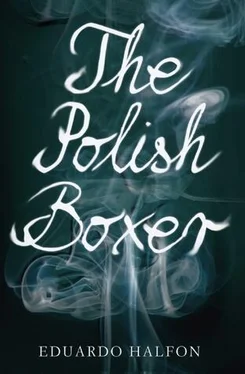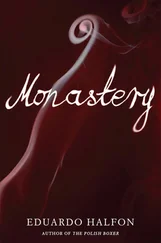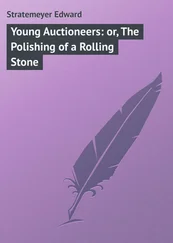Eduardo Halfon - The Polish Boxer
Здесь есть возможность читать онлайн «Eduardo Halfon - The Polish Boxer» весь текст электронной книги совершенно бесплатно (целиком полную версию без сокращений). В некоторых случаях можно слушать аудио, скачать через торрент в формате fb2 и присутствует краткое содержание. Год выпуска: 2012, Издательство: Bellevue Literary Press, Жанр: Современная проза, на английском языке. Описание произведения, (предисловие) а так же отзывы посетителей доступны на портале библиотеки ЛибКат.
- Название:The Polish Boxer
- Автор:
- Издательство:Bellevue Literary Press
- Жанр:
- Год:2012
- ISBN:нет данных
- Рейтинг книги:4 / 5. Голосов: 1
-
Избранное:Добавить в избранное
- Отзывы:
-
Ваша оценка:
- 80
- 1
- 2
- 3
- 4
- 5
The Polish Boxer: краткое содержание, описание и аннотация
Предлагаем к чтению аннотацию, описание, краткое содержание или предисловие (зависит от того, что написал сам автор книги «The Polish Boxer»). Если вы не нашли необходимую информацию о книге — напишите в комментариях, мы постараемся отыскать её.
marks the debut of a major new Latin American voice in English.
The Polish Boxer — читать онлайн бесплатно полную книгу (весь текст) целиком
Ниже представлен текст книги, разбитый по страницам. Система сохранения места последней прочитанной страницы, позволяет с удобством читать онлайн бесплатно книгу «The Polish Boxer», без необходимости каждый раз заново искать на чём Вы остановились. Поставьте закладку, и сможете в любой момент перейти на страницу, на которой закончили чтение.
Интервал:
Закладка:
Proja, said Slobodan, handing me a plate of something a bit like fried dumplings. And a cold beer, he added. It was warm. We both drank and ate in silence, a private silence amid so much noise and bustle. I had a lot of respect for the way he gave me my space, the way he didn’t ask me anything, and maybe because of that, or maybe because I needed to shed a deadweight, I started talking to him about Milan Rakić and San José el Viejo and every postcard he’d sent me before disappearing into a damn myth of his own, and after I don’t know how many more little dumplings and beers and cigarettes, I’d told him everything. Slobodan, offering no judgment, left some bills on the table and calmly said let’s go, I’m tired.
I got back to the apartment drunk and wide-awake. I turned on the TV. All the channels, or almost all the channels, were showing porn films: some very genteel English ones, some of black men and women with perfect bodies and the stamina of horses, and others that were simple and homemade and badly acted. I always preferred the badly acted ones. I ended up watching a slightly ugly young blond girl who, from time to time, looked at the camera and shouted something and made cartoonish grimaces of pleasure, but then she’d forget that they were fucking her and someone behind the camera would remind her and she’d turn around to look at him with surprise and immediately start up with the almighty shrieking again. And I stayed like that for a long time, spiritually reconciling myself to life.
I slept in. I’d unplugged the phone. I drew the curtains and noticed that, for the first time since my arrival, the sun had come out, but that’s really just a figure of speech, because it was still half-overcast. I got dressed quickly. I took the yellow envelope from my suitcase and went out.
Kalemegdan, I said to the taxi driver, showing him the last postcard. I asked him in Spanish and then in English if it was a park. Park, park, he replied, apparently annoyed.
At the gate was a line of hawkers sitting on the ground, each with a blanket covered with figurines and chinaware and antique coins and prints of Tito and little lace tablecloths and lighters and secondhand hats and who knows what else. I bought a pack of Lucky Strikes. I lit one. I started to walk. It was still cold. The trees were gray and bony and looked like something out of a Tim Burton film. Remnants of the already-melting snow shimmered on the grass like little puddles of milky coffee. I arrived at the banks of the Danube or maybe the Sava, I don’t know: I’d been told the two rivers joined right there in Belgrade, in the same way as two great empires had done centuries before. A low stone wall separated the park from the river. I sat down on it and immediately noticed a sour, putrid smell, probably coming from the water. Far off on the other side there was a row of floating houses or something that looked like that. I stubbed my cigarette out on the ground and kept walking. I walked a long way. I reached the fortress. I glanced at a sign in Cyrillic lettering. To go in, you had to cross a hanging bridge strung over a deep ditch, which in some other time had surely been a pit crawling with hungry crocodiles and dragons. There was nothing but damp inside the ruins, and I hurried on to get out the other side, where in an open field there was an exhibit with tanks and machine guns and armored cars and all kinds of war relics. A pathetic sort of museum, dedicated to the detritus of so many wars.
I sat down on a green bench and, lighting another cigarette, started looking back through Milan’s postcards, scrutinizing and rereading them but much less naïvely now, much less passively, looking at them almost as though with a magnifying glass for the slightest detail or fragment or phrase that might shed a bit of light on things, or maybe, given the way things were going, I thought or perhaps even said out loud, throw another handful of darkness over it all. I had read eight or ten or twelve of them when suddenly, as though lost in that sea of postcards, a white card appeared with a drawing of one of Lía’s orgasms. The last time, I supposed, before we’d gone to the airport, with her sky blue doctor’s outfit thrown on the floor and her scratching my back and arms while telling me not to come, that this time I shouldn’t come, and so I hadn’t. Saudade, it said in quick, majestic letters above a solitary, fluid black line, a line that ascended and descended symmetrically, and with an odd and unexpected hook at the end. Simple. Elegant. And underneath, in brackets: E boa sorte em Póvoa, meu Dudú. I looked at the drawing carefully, trying to decipher it, but instead I thought about all the lines of Lía’s orgasms, about the lines of her body, about the lines on my palm, about the lines that join the stars to form constellations, about the five lines of a musical stave that held Milan back so much, about the lines that unite and divide and reunite the Balkan countries only to divide them again, about the ideological and religious lines that fracture the world and are making it more wretched all the time, and about the tangled web of events and people that, like the tiny dots of a single flourishing sketch, had led me to the banks of some river in Belgrade. I didn’t know which river in Belgrade. I understood nothing. I felt superfluous.
As I left the park, I found a welcoming café with a blackboard in the window announcing the menu of the day in Serbian. I chose a table with a view of the street. The waiter came up and tried to translate the menu for me with gestures and faces and sign language that were no less Serbian. It didn’t work. I pointed to the board and nodded boldly and then asked for a coffee. Big, I said to him, holding an invisible balloon in my hands. I lit a cigarette and drank the coffee quickly to warm up a bit. First, a tomato, cucumber and feta salad. Next, a plate of white beans with a couple of sausages on top. Along with my chocolate cake I asked for another coffee and lit another cigarette and spent a while looking out. It was already nighttime. Snow had begun to fall, softly, looking almost fake. A family of Gypsies stopped just outside the window. The boy, who couldn’t have been more than four, was crying while his mother told him off in Serbian or Romany. An elderly woman — the boy’s grandmother, I suppose — was a few paces ahead, fed up with all the fuss. The father watched in silence, his hands in his overcoat pockets. Come on, the mother ordered the boy, or let’s go, or something like that, and she started to walk on, to leave him behind. The Gypsy boy sullenly stayed put. Well, don’t come then, she shouted, or something similar, in Serbian or Romany, then let out a snort like a furious bull and carried on walking with the elderly woman, washing her hands of the matter. Entrenched in his stubbornness, the boy didn’t move. His father simply looked at him, saying nothing, remaining two or three paces ahead. A standoff. Who will outlast whom. Who is stronger. Which horseman is tougher. They could carry him, I thought as I finished my coffee, make him go with them. They could also leave him until his temper passed and he would have to catch up to them. The two women, unconcerned, were already some way off. Father and son remained three paces apart, not speaking. Suddenly, as the snow was just beginning to whiten them, the father held out his hand to his son, gently. The boy hesitated. Then, with the obligatory reluctance, he took his father’s hand, and so they walked away from their stalemate and away from the window. I paid the bill. Quite tired now, I also left.
I was awakened at six in the morning by a hammering on the door. It’s me, he shouted, Slobodan. I sighed. I put on a T-shirt and, still in my underwear and half-asleep, opened the door. I was trying to call you yesterday, but you didn’t answer, he said as he sat down on the only chair. I sat on the bed, on the pillows. I unplugged the phone, I said, yawning. At that time of the morning, freshly bathed, he looked even more like Bob Dylan. He was wearing the same black suit of his father’s, the same black tie. His journalist’s uniform, I thought, and I very nearly said it to him. He lit a cigarette, coughing. I closed my eyes for a few seconds, as though to situate myself, and when I opened them, Slobodan was looking at me, perplexed. I made some calls, he told me, and there’s no accordionist with the last name Rakić in Belgrade. He threw me the cigarettes. Or at least he’s not legally registered under that name, he continued without giving me time to absorb the first blow, because your friend’s father could be using a pseudonym or a stage name, which is very common among Gypsies. He took a few drags on his cigarette. I talked to bar and café and restaurant owners, too, and no one knows anything about a pianist named Milan Rakić, which in a way is understandable. You saw yourself the other night how Gypsy musicians arrive in those places and then leave again without saying anything, without talking to anyone. Also, yesterday afternoon I was able to talk to the new director of the classical music conservatory, a friendly Hungarian guy, who told me that the name Rakić wasn’t familiar to him but that he’d only been in Belgrade a few months and would consult some colleagues. Slobodan puffed out a mouthful of smoke and said he’s a ghost, this Rakić of yours, and he smiled for the first time since I’d met him. He fell quiet then, perhaps waiting for me to talk or explain something. I had nothing to explain. So get dressed, he ordered, we have to get there early. Where do we have to get early? I asked him, standing up and no longer feeling sleepy at all. Sremčica, he said. And what’s that? A Gypsy camp, he replied. Make sure you bring the photo of your friend. And cigarettes. And plenty of money, too.
Читать дальшеИнтервал:
Закладка:
Похожие книги на «The Polish Boxer»
Представляем Вашему вниманию похожие книги на «The Polish Boxer» списком для выбора. Мы отобрали схожую по названию и смыслу литературу в надежде предоставить читателям больше вариантов отыскать новые, интересные, ещё непрочитанные произведения.
Обсуждение, отзывы о книге «The Polish Boxer» и просто собственные мнения читателей. Оставьте ваши комментарии, напишите, что Вы думаете о произведении, его смысле или главных героях. Укажите что конкретно понравилось, а что нет, и почему Вы так считаете.












